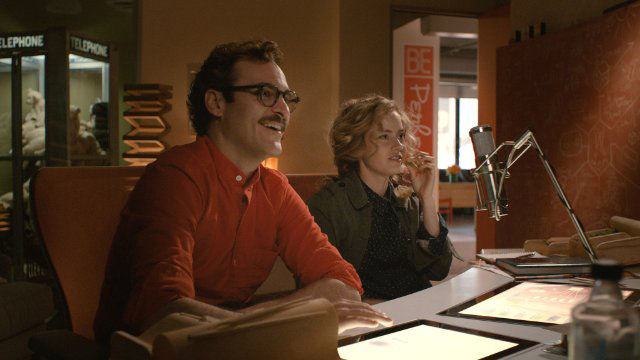Many a tech fan, over the years, may have casually declared his love for this or that cutting-edge gadget. But all would have to take a backseat to Theodore Twombly (Joaquin Phoenix), the main character in the quirky romantic drama "Her" (Warner Bros.).
On the rebound from a pending divorce --- Rooney Mara plays his soon-to-be-ex, Catherine --- depressed Theodore, who lives in a slightly futuristic version of Los Angeles, carries geekiness to a whole new level by falling for an innovative operating system called Samantha (voice of Scarlett Johansson). He does so despite the fact that Samantha has no body other than the casing of whatever computer she's guiding.
Writer-director Spike Jonze ("Where the Wild Things Are") leaps over such issues as whether artificial intelligence can ever include emotion --- the feelings at work in the central relationship are shown to be mutual --- to achieve some moments of poignancy and humor. And his film's bizarre premise makes it difficult to assess, as a whole, from a real-life moral and spiritual perspective.
But numerous problematic interludes along the way to a fairly acceptable conclusion make this fit fare for the sturdiest grown-ups only. It is not for the casual movie patron or for those lacking in faith formation. Though more thoughtful than many a Hollywood offering, "Her" requires a thoroughly attentive response from those prepared --- and equipped --- to withstand its often seamy details.
The film contains strong sexual content, including aberrant bedroom behavior, semigraphic nonmarital sexual activity, a glimpse of full female nudity and brief obscene images as well as much rough and crude language. The Catholic News Service classification is L (limited adult audience, films whose problematic content many adults would find troubling). The Motion Picture Association of America rating is R (restricted, under 17 requires accompanying parent or adult guardian).
The Legend of Hercules (Summit)
An embarrassingly weak film about the personification of strength, the 3-D action adventure "The Legend of Hercules" (Summit) is nothing short of woeful. Adult viewers may be too distracted by the film's aesthetic shortcomings to notice the mostly innocuous nature of its vulgarity-free script on which director Renny Harlin collaborated with three others. Along the way, vaguely drawn and passing parallels are made between Hercules and Jesus. Thus the people of Tiryns repeatedly hail Hercules as their savior, and a climactic scene finds him offering his own life for those of his comrades while hanging in chains in roughly the posture of Christ on the cross. While not offensive to Christian sensibilities, these sketchy allusions are as ineptly handled as every other element in Harlin's lump of mythological lead. The film contains considerable but bloodless combat violence, a suicide, implied premarital sexual activity, scenes of sensuality and mature references. The CNS classification is A-III (adults). The MPAA rating is PG-13 (parents strongly cautioned; some material may be inappropriate for children under 13).
Paranormal Activity: The Marked Ones (Paramount)
Writer-director Christopher Landon maintains the admirable tradition of minimal bloodletting that has characterized this spooky franchise since its 2007 debut. But he also ratchets up the adult content with a steady flow of vulgarities and a scene of occult rites performed without clothing. Perhaps the tough talk is meant to be in keeping with a shift in venue from the suburban setting of the previous films to a working-class Latino section of Oxnard. The black-arts back story is just there for window dressing. More troubling is the combination of Catholic prayer and Santeria practices used to combat a character’s supernatural woes. Along with the elements cited above, this potentially confusing admixture of scriptural faith and barely disguised polytheism prevents endorsement for young or impressionable moviegoers. In fact, with the found-footage conceit underlying all the "Paranormal Activity" pictures beginning to feel threadbare, even those few mature horror fans who make up the appropriate audience for this fifth outing in the series may find it less rewarding than its predecessors. The film contains some violence with brief gore, a suicide, full nudity, nongraphic nonmarital sexual activity, drug use, a couple of instances of profanity, pervasive rough and crude language and a few sexual jokes, one involving an obscene image. The CNS classification is L. The MPAA rating is R.
---CNS
John Mulderig is on the staff of Catholic News Service. Full-length reviews: www.catholicnews.com/movies.htm.

